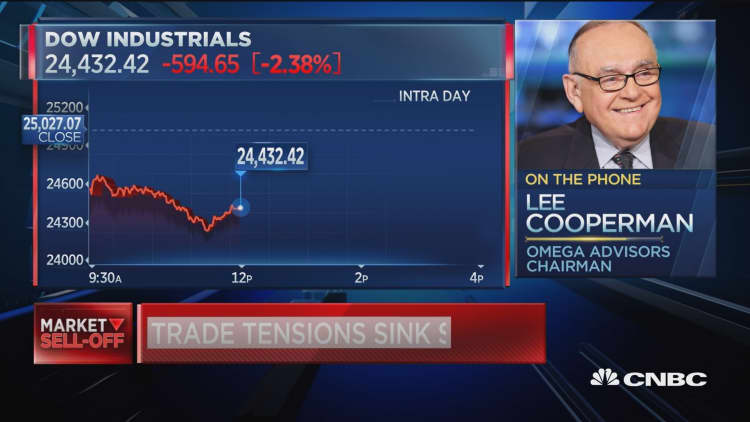
Omega Advisors founder Leon Cooperman on Thursday blamed the Securities and Exchange Commission for failing to address the impact computerized trading has had on the broader market and how it exacerbates volatility during market swings.
"I think your next guest ought to be somebody from the SEC to explain why they have sat back calmly, quietly, without saying anything and allowing these algorithmic, trend-following models to wreak havoc with what has, up to now, been the best capital market in the world," Cooperman told CNBC's Scott Wapner on the "Halftime Report."
"In the mid-1930s, they instituted the Uptick Rule to deal with the abuses of 1929. It worked effectively for 70-odd years. They took it out in 2008 for some unexplainable reason," he added. "And they created a wild, Wild West environment in the stock market."
John Nester, a spokesman for the SEC, declined to respond to Cooperman's comments.
The billionaire's comments came after the Dow Jones Industrial Average suffered an almost 800-point drop on Tuesday and as the index fell nearly 700 points on Thursday afternoon. The major stock indexes have plummeted in recent sessions as fears over a slowdown in economic growth and the U.S.-China trade war grip market participants. The Dow later recovered the vast majority of its losses Thursday after a report that the Federal Reserve may adopt a "wait-and-see" approach to future rate hikes.
"Bear markets don't materialize out of immaculate conception. They come about from certain fundamental reasons the stock market is seeing," Cooperman said. "The number one cause of a bear market is the stock market smelling an oncoming recession. I won't cite all the economic data, but there's just no signs of recession."
The Uptick Rule mandated that every short sale be submitted at a higher price than the previous trade, ensuring that short sellers' orders would be filled on an uptick. The rule, a product of the 1930s, prevented short sellers from adding to the downward momentum of an asset already experiencing sharp declines.
The rule was removed in 2007, though an abbreviated version was been reintroduced in 2010.
"Get somebody from the SEC to explain why they eliminated the Uptick Rule and what do they think about these quantitative trading systems that have created a tremendous amount of volatility in the market, scared the public, [and] effectively raised the cost of capital to business," Cooperman said. "Why have they sat back and allowed this to go on? Maybe they have a good explanation."
He also said the turbulence in stocks is just part of a market correction because there are no hints of a recession.


